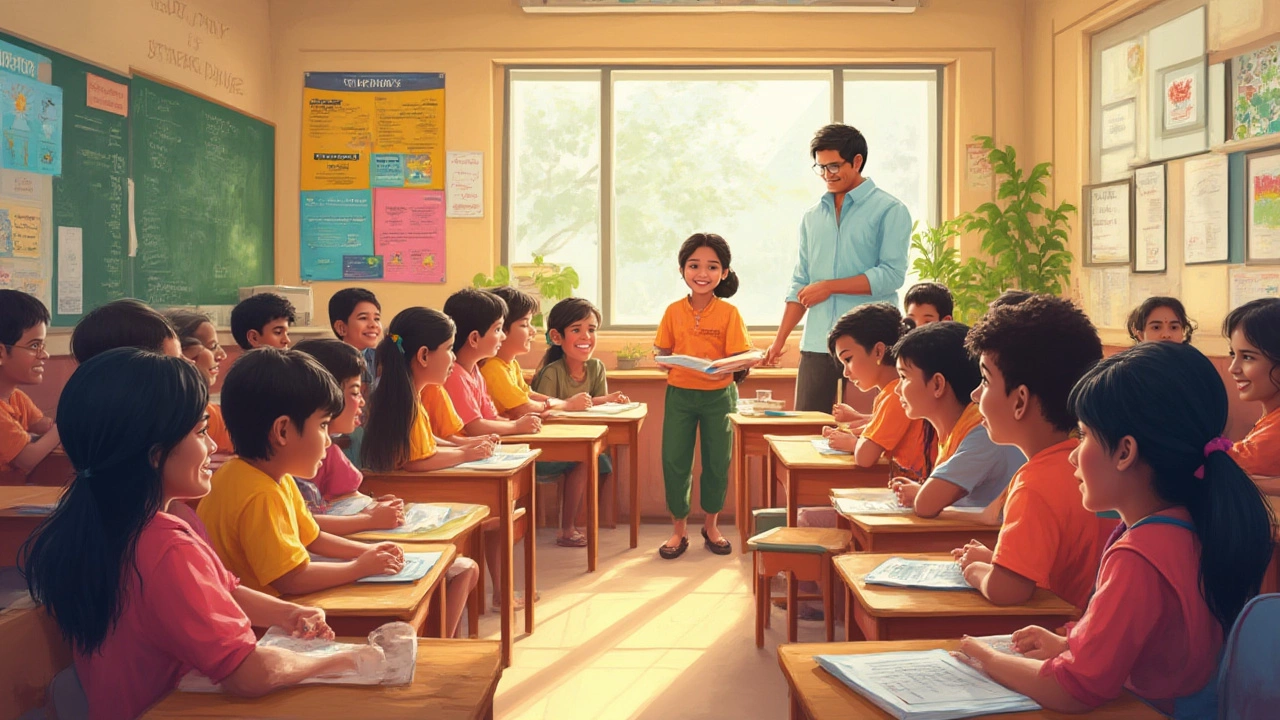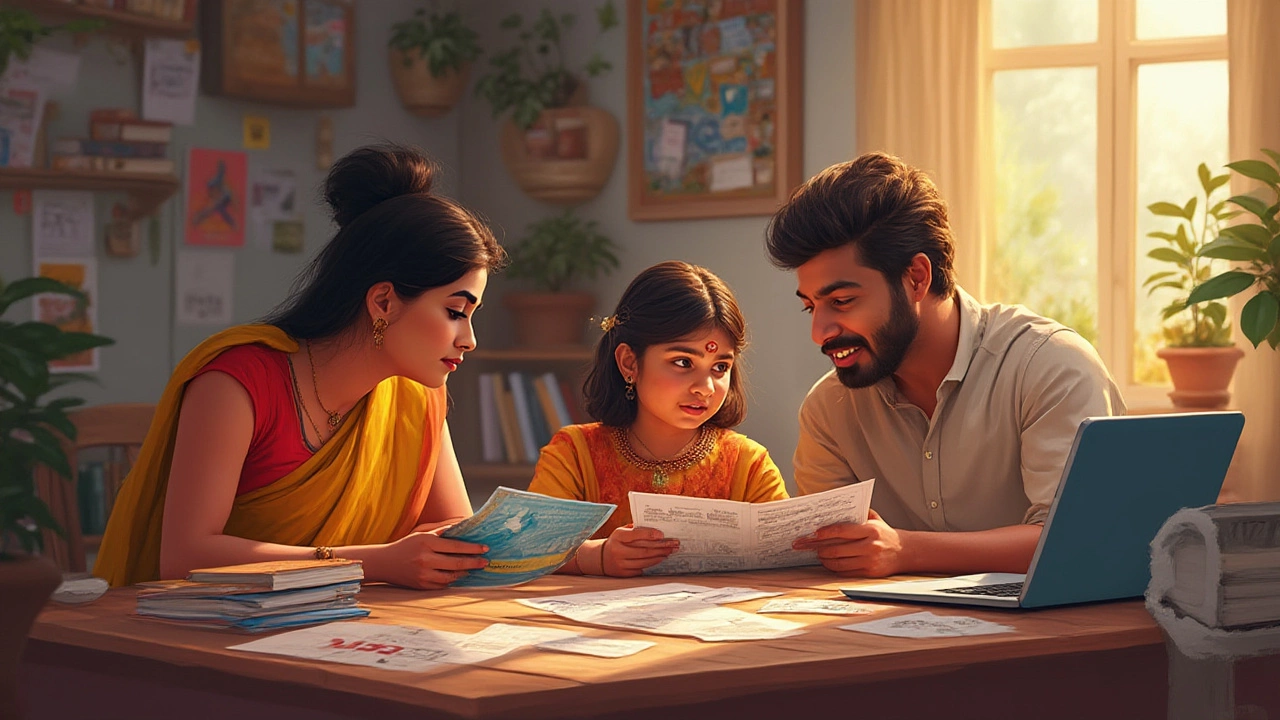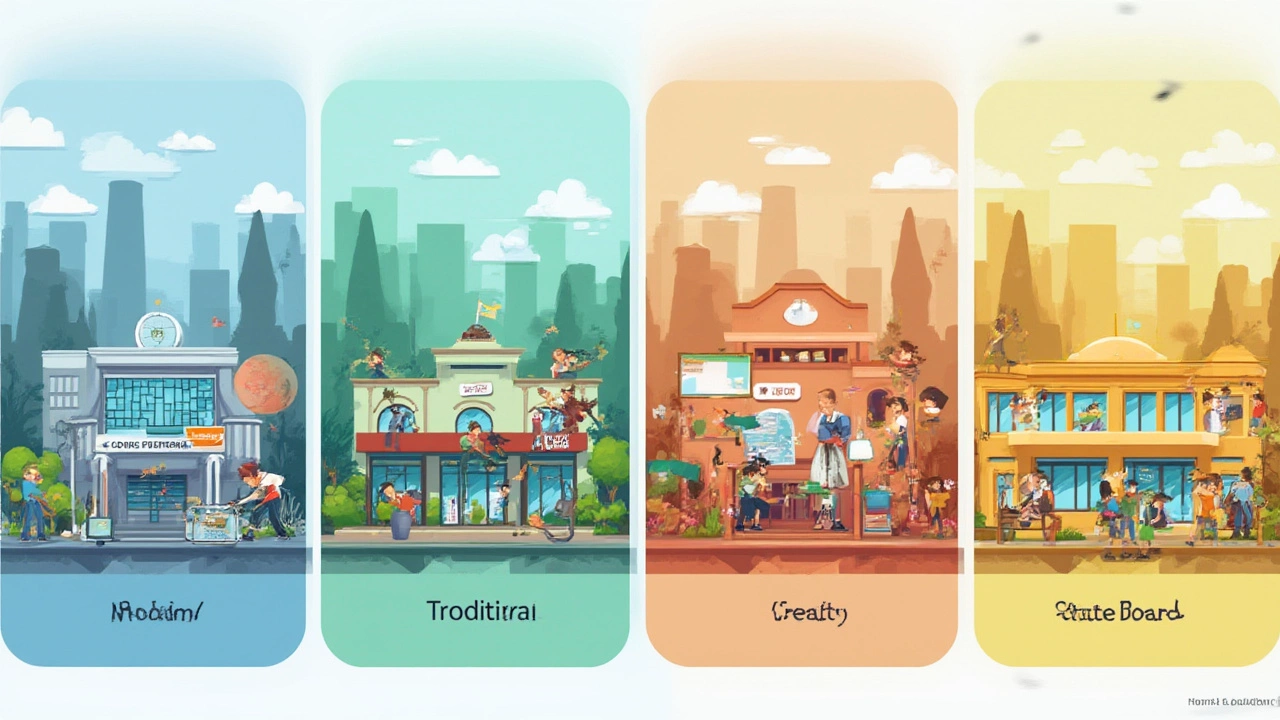Which Syllabus is Best for a Child? A Clear Guide to Choosing the Right School Curriculum in 2025
 Jul, 14 2025
Jul, 14 2025
Back in 2021, more than 210 education boards operated in India alone, each promising something unique for your child’s future. In the UK, it’s a wild run with GCSEs, A-levels, and the rising International Baccalaureate. Globally, the number one thing parents fret about? Picking the right syllabus. No one wants their child stuck in endless rote memorisation or left adrift without basic maths skills by age 12. So, what does “best syllabus” really mean? It often depends on location, your child’s needs, and plans for higher education. But even within these, there’s a huge gulf—one curriculum powers academic Olympiad winners, while another is known for raising creative thinkers who thrive at startups. With so many pressures (university admissions, employability, future readiness), the debate over school curriculum isn’t just confusing—it’s exhausting. Yet, the stakes have never felt higher.
Understanding Major School Syllabi: From CBSE to IB and Beyond
Start walking the education minefield and you’ll meet the biggest players: CBSE (Central Board of Secondary Education), ICSE (Indian Certificate of Secondary Education), State Boards (with every state designing its own version), Cambridge IGCSE, and the IB (International Baccalaureate). That’s not counting the Scottish Curriculum for Excellence, American APs, or English A-levels, all quietly shaping lives in the background. In Edinburgh, you might spot kids following Scotland’s own curriculum, known for emphasising comprehensive skills over mindless testing. Meanwhile, in India, CBSE dominates with over 24,000 schools. It’s bluntly practical: CBSE sticks tightly to national entrance exams and focuses obsessively on science and maths basics. If your dream is an IIT or AIIMS, this is the road most travelled—it shaves off anything ‘extra’ that might distract. But even CBSE has been updating, introducing coding and critical thinking modules since 2022.
ICSE gets praise for its language-heavy, literature-rich approach and focus on “well-rounded” education. Parents notice students picking up stronger English, dabbling in more arts, and tackling application-based learning from a young age. But here’s a twist: its syllabus is bulkier and often seen as more challenging. ICSE students tend to do better in humanities and communication-heavy careers, but its STEM prep isn’t always as streamlined as CBSE’s. State Boards can vary wildly. Some are progressive—Kerala’s regularly wins praise for innovation—but others lag in practical skills. Don’t forget IGCSE and IB, fast becoming the darlings of globally mobile families. The International Baccalaureate pulls in those hoping for admissions at Oxford, Ivy Leagues, or top Australian unis. Known for projects and original research, the IB Diploma Programme produces resilient, independent thinkers. Its average tuition fee, though, can be three times higher than local boards—a factor not everyone can ignore. Here’s how these compare on key features:
| Curriculum | Main Focus | Preferred For | Testing Style | Popularity (2024) |
|---|---|---|---|---|
| CBSE | STEM, National Exams | Engineering/Medical Aspirants | Objective, Syllabus-bound | 24,000+ schools (India) |
| ICSE | Languages, All-round Dev. | Arts, Humanities, Global Competitions | Descriptive, Application-based | 2,300+ schools (India) |
| IB | Critical Thinking, Research | Global Universities/Innovation Careers | Internal Assessments, Projects | 5,700+ schools (global) |
| IGCSE | Practical Skills, Flexibility | International Mobility | Written/Oral, Modular | 11,000+ schools (global) |
| State Boards | Local Focus, Accessibility | Regional Colleges/Jobs | Varies by State | 100,000+ schools (India) |
Choosing between these isn’t only about academics. Take the IB: students spend hours on the Extended Essay and CAS (Creativity, Activity, Service) project. Many say it’s a boot camp for real-world grit, but it can be a nightmare for less self-motivated kids. In contrast, the Cambridge IGCSE is modular and allows flexible subject choices, so a child can deepen interests or dodge weak spots. Scottish Highers and National 5s in the UK break away from the old “one final exam decides all” mindset, using coursework and teacher grades to paint a fairer, broader picture.

Who Is the “Best” Syllabus Really For?
It’s easy to chase what looks shiny—like the guy next door putting his child in an IB World School because it sounds prestigious. But step back: the “best” syllabus is like the best running shoe—it fits individual needs. Kids with a flair for maths and science, obsessing over JEE or NEET, will find CBSE’s focused grind efficient. Someone with storytelling magic, art skills, or a love for theatre? They might love the creative assignments and deep dives into language that ICSE or IB offer. Then come kids with learning challenges—dyslexia, ADHD, slow processing—who risk falling behind in rigid or fast-paced systems. Here, some state boards or project-heavy curricula (like certain UK or Scandinavian systems) may actually be gentler and more supportive. A 2023 study from UCL found that young children in skill-integrated and play-rich environments showed better emotional regulation, which affected long-term academic outcomes.
The answer also changes with age. For primary children, broad exposure is key—curricula with art, sports, and science all rolled in make learning joyful. In late primary, hands-on labs and demonstration-based maths boost understanding. By secondary school, pressure mounts: entrance exams, peer competition, and building a portfolio that wows university admissions. Here, syllabi that align with your goals make sense. If relocation is likely (say, moving from Delhi to Dubai or Mumbai to Manchester), IGCSE and IB work for seamless transfers. If college dreams are local, sticking to respected local / national boards often makes admissions smoother and pockets lighter.
The silent detail most parents miss: teacher quality and school environment can easily outweigh syllabus structure. Plenty of CBSE and ICSE schools have replaced mind-numbing lectures with debates, science fairs, and coding clubs. Even IB World Schools vary by location; a great teacher in a regular state board can light up learning more than the fanciest international syllabus.
Also, curriculum pressure can stifle. A 2024 survey of UK parents showed that 61% feared primary school assessments were creating “test anxiety” and hurting children’s love for learning. Overscheduling is not rare: IB students report 30-40 hours of schoolwork weekly outside class, often at the cost of sleep or social time. No syllabus magic erases those worries unless balanced with attention to mental health and time for hobbies.

Practical Tips for Picking the Right School Curriculum
It feels like an impossible riddle, this syllabus question. But here’s a checklist that’s actually rooted in real-life needs and the latest educational research:
- best school syllabus: Ask what your child loves and where they shine. A strong syllabus is worthless if your child dreads school every morning.
- Check higher education plans. For careers in Indian medicine, engineering, or law, CBSE or state boards strongly align with local entrance exams. For US, UK, Canada, or Australia admissions, IB and IGCSE can carry more weight.
- Don’t ignore flexibility. Does the curriculum allow switching subjects in case your child’s interests change dramatically at age 14? IGCSE is great here, CBSE and ICSE less so.
- Scout the school, not just the syllabus. Meet the teachers, look for extracurriculars, and find out if active learning and wellbeing are prioritized over rote grades.
- Weigh the long-term costs. IB, IGCSE, and private boards can run into lakhs or tens of thousands of pounds a year. Public and state board options are lighter on the pocket and sometimes offer more diverse student communities.
- Dig into teaching style. Is there space for mistakes, play, and exploration? Are projects, inquiry, and experiments a regular part, especially in science and languages?
- Consider special needs. If your child is neurodiverse, a rigid exam-heavy system could be stressful. Project-based and skill-diverse syllabi often support diverse learners better.
- Think about relocation. If you plan to move internationally, IB or IGCSE will offer smoother transitions.
The real killer trick: talk to students. Nothing beats straight-from-the-source answers. Ask older kids what surprised them, what bored them, and what truly helped when moving up to college or jobs. Check parent forums but take them with a pinch of salt—what works for the neighbour’s child might backfire for yours.
Don’t get trapped by trends or peer pressure. The “best” curriculum fits your child’s abilities, ambitions, and yes, even their weaknesses. It expands their skills, not their stress levels. Plenty of high achievers came from humble regional or state boards, just as some international curriculum kids lost out to test anxiety and burnout. At the end of the day, the dizzying choice is an opportunity: you can shape your child’s school years to match their reality, not just educational fashion. Stay practical, ask awkward questions, and don’t forget—your child’s health and happiness matter just as much as the name on their report card.